Detailed Report on Entrepreneurship and Small Business Management
VerifiedAdded on 2020/12/29
|15
|4448
|263
Report
AI Summary
This report delves into the multifaceted world of entrepreneurship and small business management, examining various aspects from different types of entrepreneurial ventures and their typologies, to the similarities and differences between them. It analyzes the impact of micro and small businesses on the economy, supported by relevant data and statistics, and highlights the importance of startups in fostering social economic growth. The report identifies key characteristics, traits, and skills of successful entrepreneurs, as well as how background and experience can either hinder or foster entrepreneurial mindsets. It provides a comprehensive overview of the subject matter, discussing the role of small businesses like Midsummer house and its influence on the UK economy, while also touching on the importance of innovation and providing opportunities for employment.

Entrepreneurship and
small business
management assignment
small business
management assignment
Paraphrase This Document
Need a fresh take? Get an instant paraphrase of this document with our AI Paraphraser
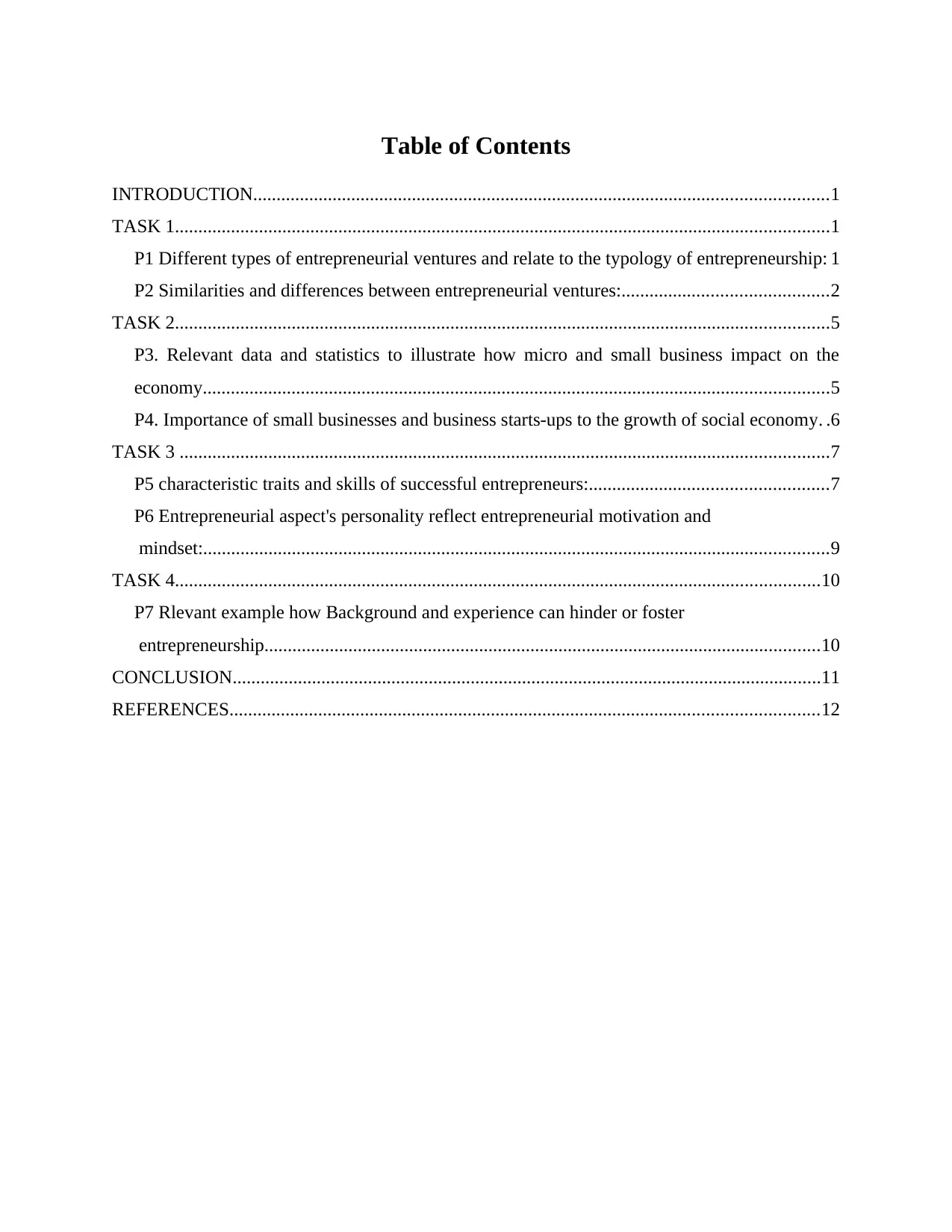
Table of Contents
INTRODUCTION...........................................................................................................................1
TASK 1............................................................................................................................................1
P1 Different types of entrepreneurial ventures and relate to the typology of entrepreneurship: 1
P2 Similarities and differences between entrepreneurial ventures:............................................2
TASK 2............................................................................................................................................5
P3. Relevant data and statistics to illustrate how micro and small business impact on the
economy......................................................................................................................................5
P4. Importance of small businesses and business starts-ups to the growth of social economy. .6
TASK 3 ...........................................................................................................................................7
P5 characteristic traits and skills of successful entrepreneurs:...................................................7
P6 Entrepreneurial aspect's personality reflect entrepreneurial motivation and
mindset:......................................................................................................................................9
TASK 4..........................................................................................................................................10
P7 Rlevant example how Background and experience can hinder or foster
entrepreneurship.......................................................................................................................10
CONCLUSION..............................................................................................................................11
REFERENCES..............................................................................................................................12
INTRODUCTION...........................................................................................................................1
TASK 1............................................................................................................................................1
P1 Different types of entrepreneurial ventures and relate to the typology of entrepreneurship: 1
P2 Similarities and differences between entrepreneurial ventures:............................................2
TASK 2............................................................................................................................................5
P3. Relevant data and statistics to illustrate how micro and small business impact on the
economy......................................................................................................................................5
P4. Importance of small businesses and business starts-ups to the growth of social economy. .6
TASK 3 ...........................................................................................................................................7
P5 characteristic traits and skills of successful entrepreneurs:...................................................7
P6 Entrepreneurial aspect's personality reflect entrepreneurial motivation and
mindset:......................................................................................................................................9
TASK 4..........................................................................................................................................10
P7 Rlevant example how Background and experience can hinder or foster
entrepreneurship.......................................................................................................................10
CONCLUSION..............................................................................................................................11
REFERENCES..............................................................................................................................12
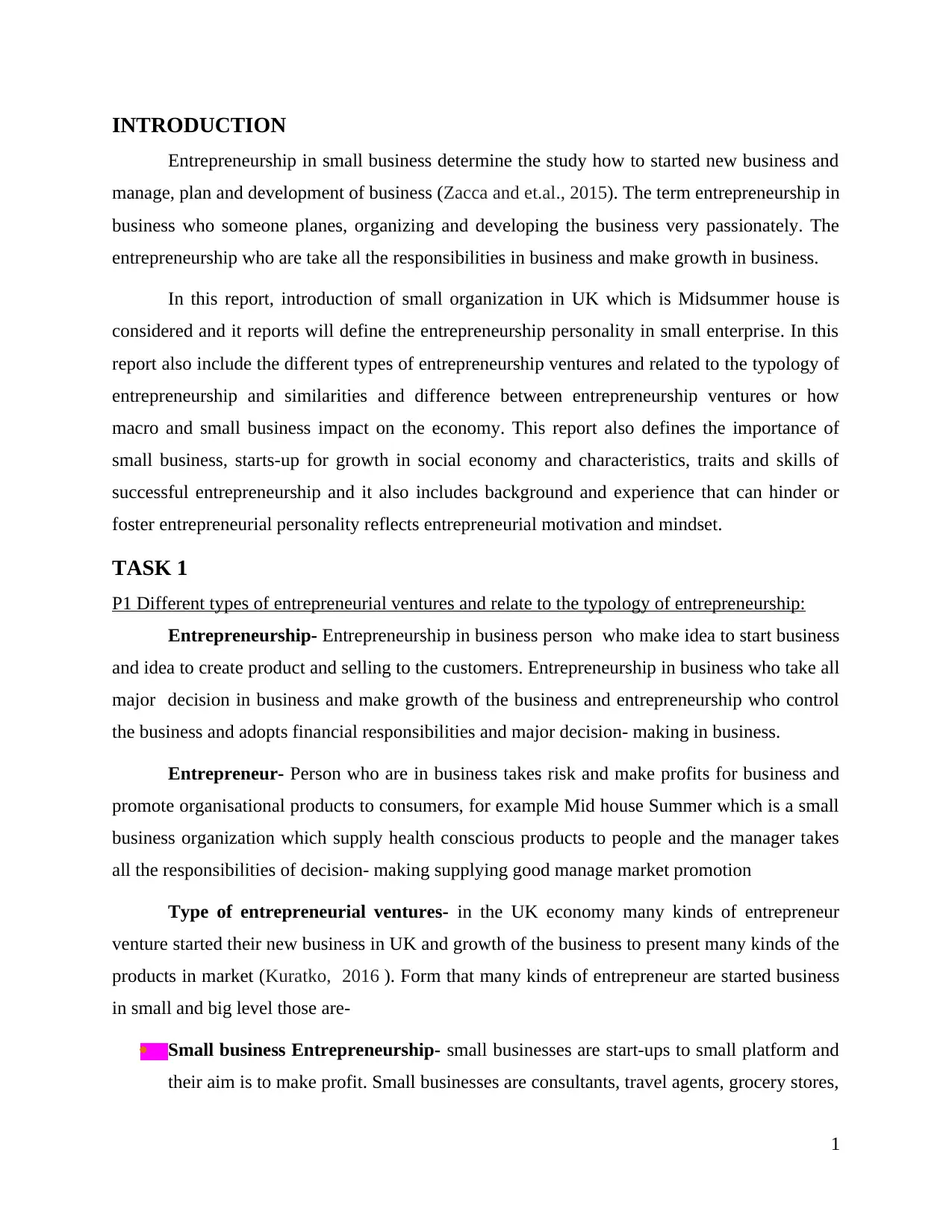
INTRODUCTION
Entrepreneurship in small business determine the study how to started new business and
manage, plan and development of business (Zacca and et.al., 2015). The term entrepreneurship in
business who someone planes, organizing and developing the business very passionately. The
entrepreneurship who are take all the responsibilities in business and make growth in business.
In this report, introduction of small organization in UK which is Midsummer house is
considered and it reports will define the entrepreneurship personality in small enterprise. In this
report also include the different types of entrepreneurship ventures and related to the typology of
entrepreneurship and similarities and difference between entrepreneurship ventures or how
macro and small business impact on the economy. This report also defines the importance of
small business, starts-up for growth in social economy and characteristics, traits and skills of
successful entrepreneurship and it also includes background and experience that can hinder or
foster entrepreneurial personality reflects entrepreneurial motivation and mindset.
TASK 1
P1 Different types of entrepreneurial ventures and relate to the typology of entrepreneurship:
Entrepreneurship- Entrepreneurship in business person who make idea to start business
and idea to create product and selling to the customers. Entrepreneurship in business who take all
major decision in business and make growth of the business and entrepreneurship who control
the business and adopts financial responsibilities and major decision- making in business.
Entrepreneur- Person who are in business takes risk and make profits for business and
promote organisational products to consumers, for example Mid house Summer which is a small
business organization which supply health conscious products to people and the manager takes
all the responsibilities of decision- making supplying good manage market promotion
Type of entrepreneurial ventures- in the UK economy many kinds of entrepreneur
venture started their new business in UK and growth of the business to present many kinds of the
products in market (Kuratko, 2016 ). Form that many kinds of entrepreneur are started business
in small and big level those are-
Small business Entrepreneurship- small businesses are start-ups to small platform and
their aim is to make profit. Small businesses are consultants, travel agents, grocery stores,
1
Entrepreneurship in small business determine the study how to started new business and
manage, plan and development of business (Zacca and et.al., 2015). The term entrepreneurship in
business who someone planes, organizing and developing the business very passionately. The
entrepreneurship who are take all the responsibilities in business and make growth in business.
In this report, introduction of small organization in UK which is Midsummer house is
considered and it reports will define the entrepreneurship personality in small enterprise. In this
report also include the different types of entrepreneurship ventures and related to the typology of
entrepreneurship and similarities and difference between entrepreneurship ventures or how
macro and small business impact on the economy. This report also defines the importance of
small business, starts-up for growth in social economy and characteristics, traits and skills of
successful entrepreneurship and it also includes background and experience that can hinder or
foster entrepreneurial personality reflects entrepreneurial motivation and mindset.
TASK 1
P1 Different types of entrepreneurial ventures and relate to the typology of entrepreneurship:
Entrepreneurship- Entrepreneurship in business person who make idea to start business
and idea to create product and selling to the customers. Entrepreneurship in business who take all
major decision in business and make growth of the business and entrepreneurship who control
the business and adopts financial responsibilities and major decision- making in business.
Entrepreneur- Person who are in business takes risk and make profits for business and
promote organisational products to consumers, for example Mid house Summer which is a small
business organization which supply health conscious products to people and the manager takes
all the responsibilities of decision- making supplying good manage market promotion
Type of entrepreneurial ventures- in the UK economy many kinds of entrepreneur
venture started their new business in UK and growth of the business to present many kinds of the
products in market (Kuratko, 2016 ). Form that many kinds of entrepreneur are started business
in small and big level those are-
Small business Entrepreneurship- small businesses are start-ups to small platform and
their aim is to make profit. Small businesses are consultants, travel agents, grocery stores,
1
⊘ This is a preview!⊘
Do you want full access?
Subscribe today to unlock all pages.

Trusted by 1+ million students worldwide
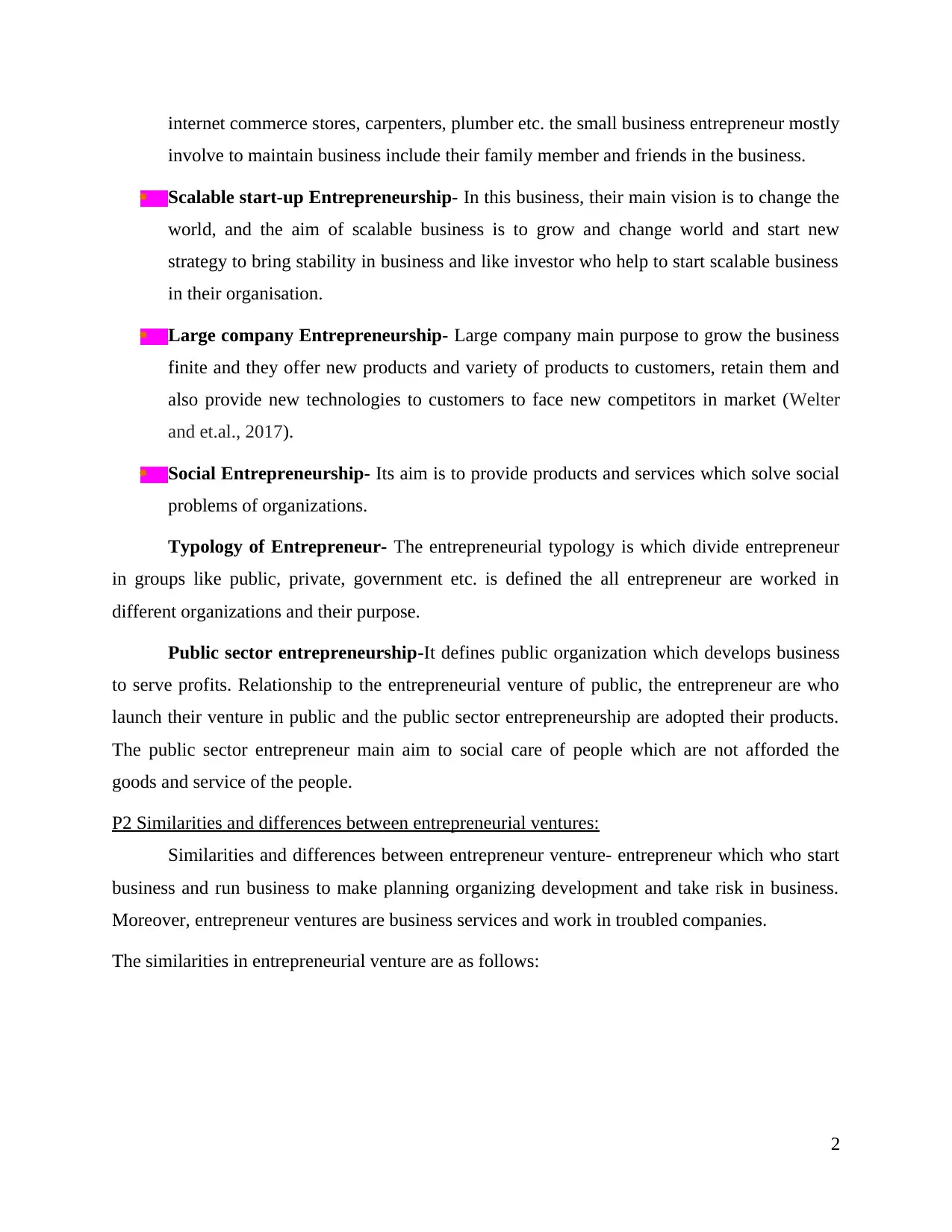
internet commerce stores, carpenters, plumber etc. the small business entrepreneur mostly
involve to maintain business include their family member and friends in the business.
Scalable start-up Entrepreneurship- In this business, their main vision is to change the
world, and the aim of scalable business is to grow and change world and start new
strategy to bring stability in business and like investor who help to start scalable business
in their organisation.
Large company Entrepreneurship- Large company main purpose to grow the business
finite and they offer new products and variety of products to customers, retain them and
also provide new technologies to customers to face new competitors in market (Welter
and et.al., 2017).
Social Entrepreneurship- Its aim is to provide products and services which solve social
problems of organizations.
Typology of Entrepreneur- The entrepreneurial typology is which divide entrepreneur
in groups like public, private, government etc. is defined the all entrepreneur are worked in
different organizations and their purpose.
Public sector entrepreneurship-It defines public organization which develops business
to serve profits. Relationship to the entrepreneurial venture of public, the entrepreneur are who
launch their venture in public and the public sector entrepreneurship are adopted their products.
The public sector entrepreneur main aim to social care of people which are not afforded the
goods and service of the people.
P2 Similarities and differences between entrepreneurial ventures:
Similarities and differences between entrepreneur venture- entrepreneur which who start
business and run business to make planning organizing development and take risk in business.
Moreover, entrepreneur ventures are business services and work in troubled companies.
The similarities in entrepreneurial venture are as follows:
2
involve to maintain business include their family member and friends in the business.
Scalable start-up Entrepreneurship- In this business, their main vision is to change the
world, and the aim of scalable business is to grow and change world and start new
strategy to bring stability in business and like investor who help to start scalable business
in their organisation.
Large company Entrepreneurship- Large company main purpose to grow the business
finite and they offer new products and variety of products to customers, retain them and
also provide new technologies to customers to face new competitors in market (Welter
and et.al., 2017).
Social Entrepreneurship- Its aim is to provide products and services which solve social
problems of organizations.
Typology of Entrepreneur- The entrepreneurial typology is which divide entrepreneur
in groups like public, private, government etc. is defined the all entrepreneur are worked in
different organizations and their purpose.
Public sector entrepreneurship-It defines public organization which develops business
to serve profits. Relationship to the entrepreneurial venture of public, the entrepreneur are who
launch their venture in public and the public sector entrepreneurship are adopted their products.
The public sector entrepreneur main aim to social care of people which are not afforded the
goods and service of the people.
P2 Similarities and differences between entrepreneurial ventures:
Similarities and differences between entrepreneur venture- entrepreneur which who start
business and run business to make planning organizing development and take risk in business.
Moreover, entrepreneur ventures are business services and work in troubled companies.
The similarities in entrepreneurial venture are as follows:
2
Paraphrase This Document
Need a fresh take? Get an instant paraphrase of this document with our AI Paraphraser
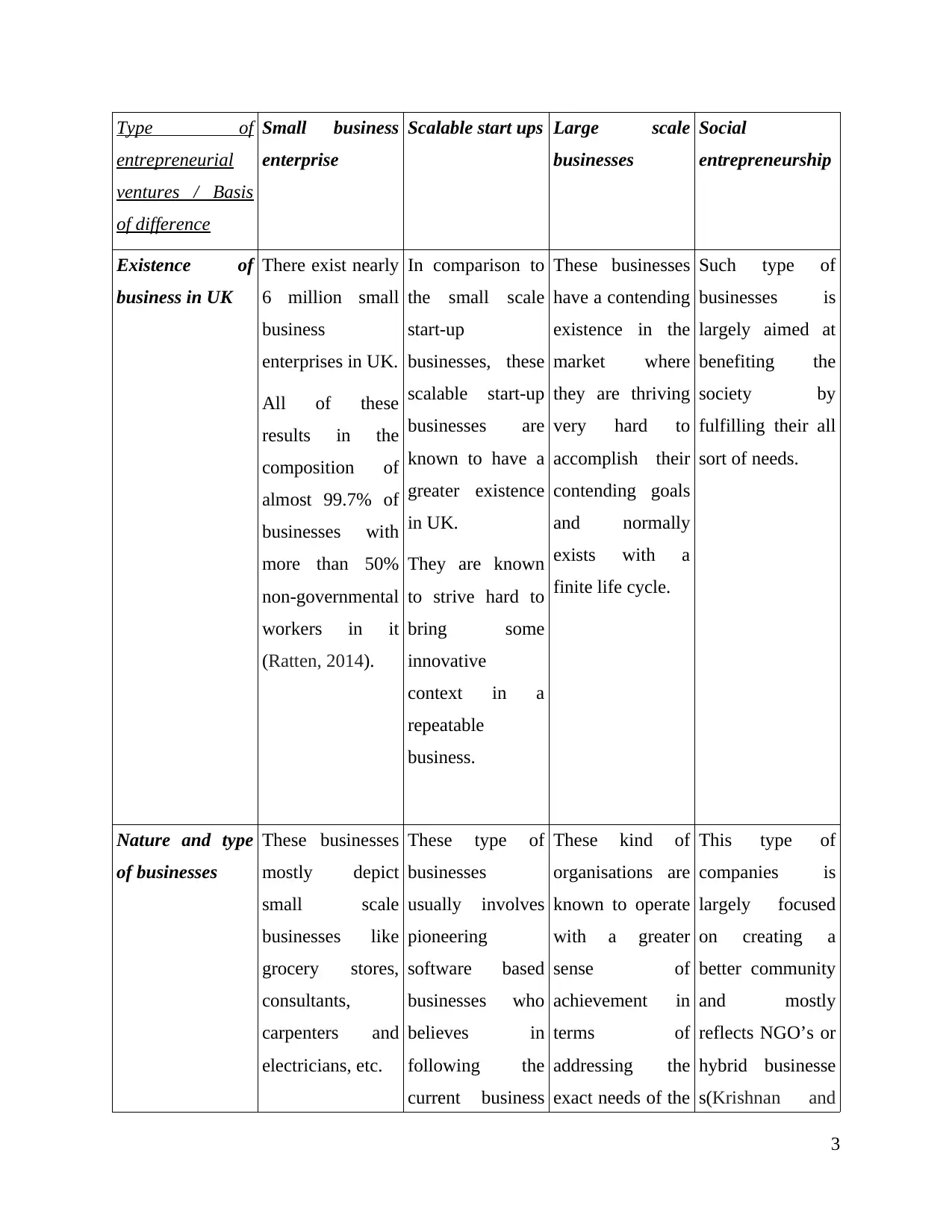
Type of
entrepreneurial
ventures / Basis
of difference
Small business
enterprise
Scalable start ups Large scale
businesses
Social
entrepreneurship
Existence of
business in UK
There exist nearly
6 million small
business
enterprises in UK.
All of these
results in the
composition of
almost 99.7% of
businesses with
more than 50%
non-governmental
workers in it
(Ratten, 2014).
In comparison to
the small scale
start-up
businesses, these
scalable start-up
businesses are
known to have a
greater existence
in UK.
They are known
to strive hard to
bring some
innovative
context in a
repeatable
business.
These businesses
have a contending
existence in the
market where
they are thriving
very hard to
accomplish their
contending goals
and normally
exists with a
finite life cycle.
Such type of
businesses is
largely aimed at
benefiting the
society by
fulfilling their all
sort of needs.
Nature and type
of businesses
These businesses
mostly depict
small scale
businesses like
grocery stores,
consultants,
carpenters and
electricians, etc.
These type of
businesses
usually involves
pioneering
software based
businesses who
believes in
following the
current business
These kind of
organisations are
known to operate
with a greater
sense of
achievement in
terms of
addressing the
exact needs of the
This type of
companies is
largely focused
on creating a
better community
and mostly
reflects NGO’s or
hybrid businesse
s(Krishnan and
3
entrepreneurial
ventures / Basis
of difference
Small business
enterprise
Scalable start ups Large scale
businesses
Social
entrepreneurship
Existence of
business in UK
There exist nearly
6 million small
business
enterprises in UK.
All of these
results in the
composition of
almost 99.7% of
businesses with
more than 50%
non-governmental
workers in it
(Ratten, 2014).
In comparison to
the small scale
start-up
businesses, these
scalable start-up
businesses are
known to have a
greater existence
in UK.
They are known
to strive hard to
bring some
innovative
context in a
repeatable
business.
These businesses
have a contending
existence in the
market where
they are thriving
very hard to
accomplish their
contending goals
and normally
exists with a
finite life cycle.
Such type of
businesses is
largely aimed at
benefiting the
society by
fulfilling their all
sort of needs.
Nature and type
of businesses
These businesses
mostly depict
small scale
businesses like
grocery stores,
consultants,
carpenters and
electricians, etc.
These type of
businesses
usually involves
pioneering
software based
businesses who
believes in
following the
current business
These kind of
organisations are
known to operate
with a greater
sense of
achievement in
terms of
addressing the
exact needs of the
This type of
companies is
largely focused
on creating a
better community
and mostly
reflects NGO’s or
hybrid businesse
s(Krishnan and
3
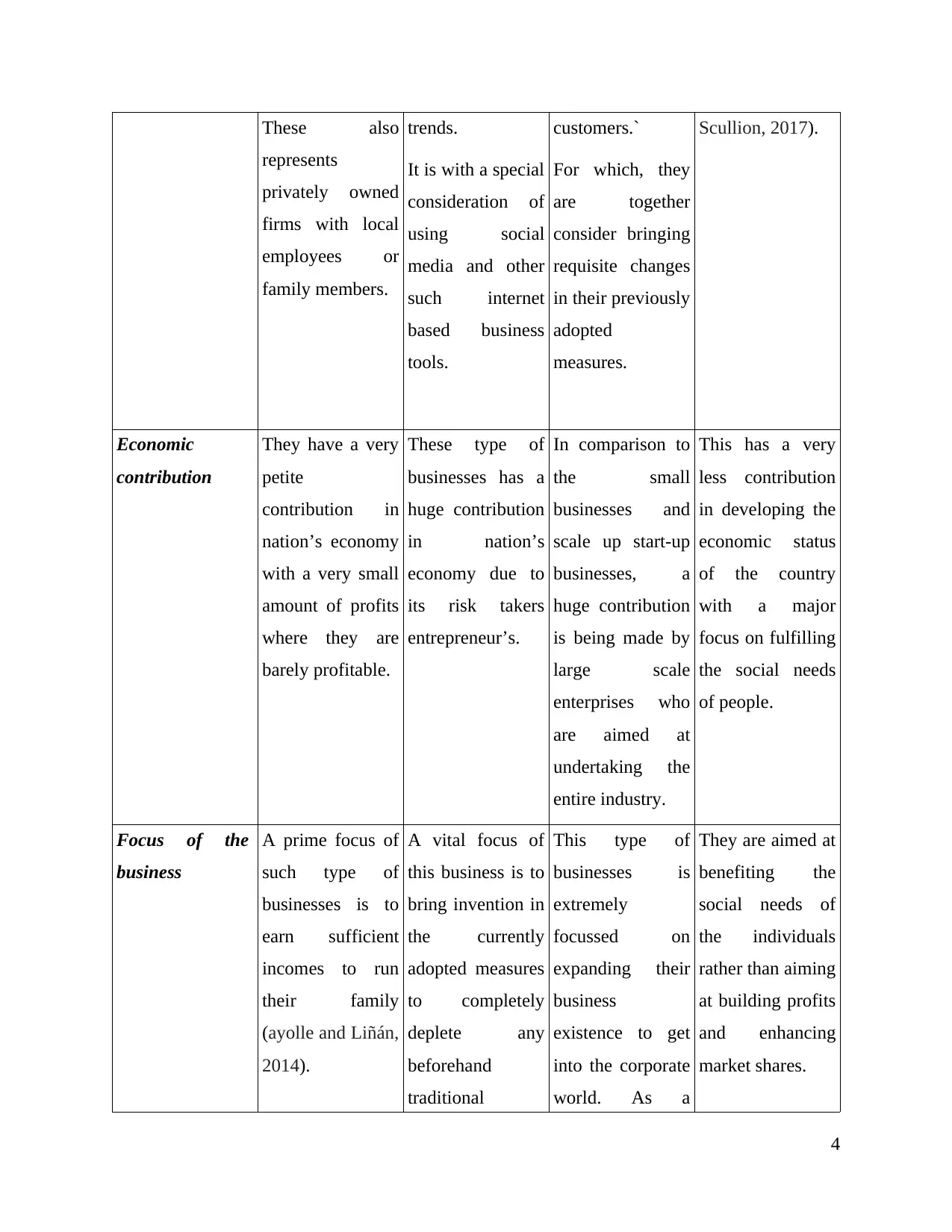
These also
represents
privately owned
firms with local
employees or
family members.
trends.
It is with a special
consideration of
using social
media and other
such internet
based business
tools.
customers.`
For which, they
are together
consider bringing
requisite changes
in their previously
adopted
measures.
Scullion, 2017).
Economic
contribution
They have a very
petite
contribution in
nation’s economy
with a very small
amount of profits
where they are
barely profitable.
These type of
businesses has a
huge contribution
in nation’s
economy due to
its risk takers
entrepreneur’s.
In comparison to
the small
businesses and
scale up start-up
businesses, a
huge contribution
is being made by
large scale
enterprises who
are aimed at
undertaking the
entire industry.
This has a very
less contribution
in developing the
economic status
of the country
with a major
focus on fulfilling
the social needs
of people.
Focus of the
business
A prime focus of
such type of
businesses is to
earn sufficient
incomes to run
their family
(ayolle and Liñán,
2014).
A vital focus of
this business is to
bring invention in
the currently
adopted measures
to completely
deplete any
beforehand
traditional
This type of
businesses is
extremely
focussed on
expanding their
business
existence to get
into the corporate
world. As a
They are aimed at
benefiting the
social needs of
the individuals
rather than aiming
at building profits
and enhancing
market shares.
4
represents
privately owned
firms with local
employees or
family members.
trends.
It is with a special
consideration of
using social
media and other
such internet
based business
tools.
customers.`
For which, they
are together
consider bringing
requisite changes
in their previously
adopted
measures.
Scullion, 2017).
Economic
contribution
They have a very
petite
contribution in
nation’s economy
with a very small
amount of profits
where they are
barely profitable.
These type of
businesses has a
huge contribution
in nation’s
economy due to
its risk takers
entrepreneur’s.
In comparison to
the small
businesses and
scale up start-up
businesses, a
huge contribution
is being made by
large scale
enterprises who
are aimed at
undertaking the
entire industry.
This has a very
less contribution
in developing the
economic status
of the country
with a major
focus on fulfilling
the social needs
of people.
Focus of the
business
A prime focus of
such type of
businesses is to
earn sufficient
incomes to run
their family
(ayolle and Liñán,
2014).
A vital focus of
this business is to
bring invention in
the currently
adopted measures
to completely
deplete any
beforehand
traditional
This type of
businesses is
extremely
focussed on
expanding their
business
existence to get
into the corporate
world. As a
They are aimed at
benefiting the
social needs of
the individuals
rather than aiming
at building profits
and enhancing
market shares.
4
⊘ This is a preview!⊘
Do you want full access?
Subscribe today to unlock all pages.

Trusted by 1+ million students worldwide
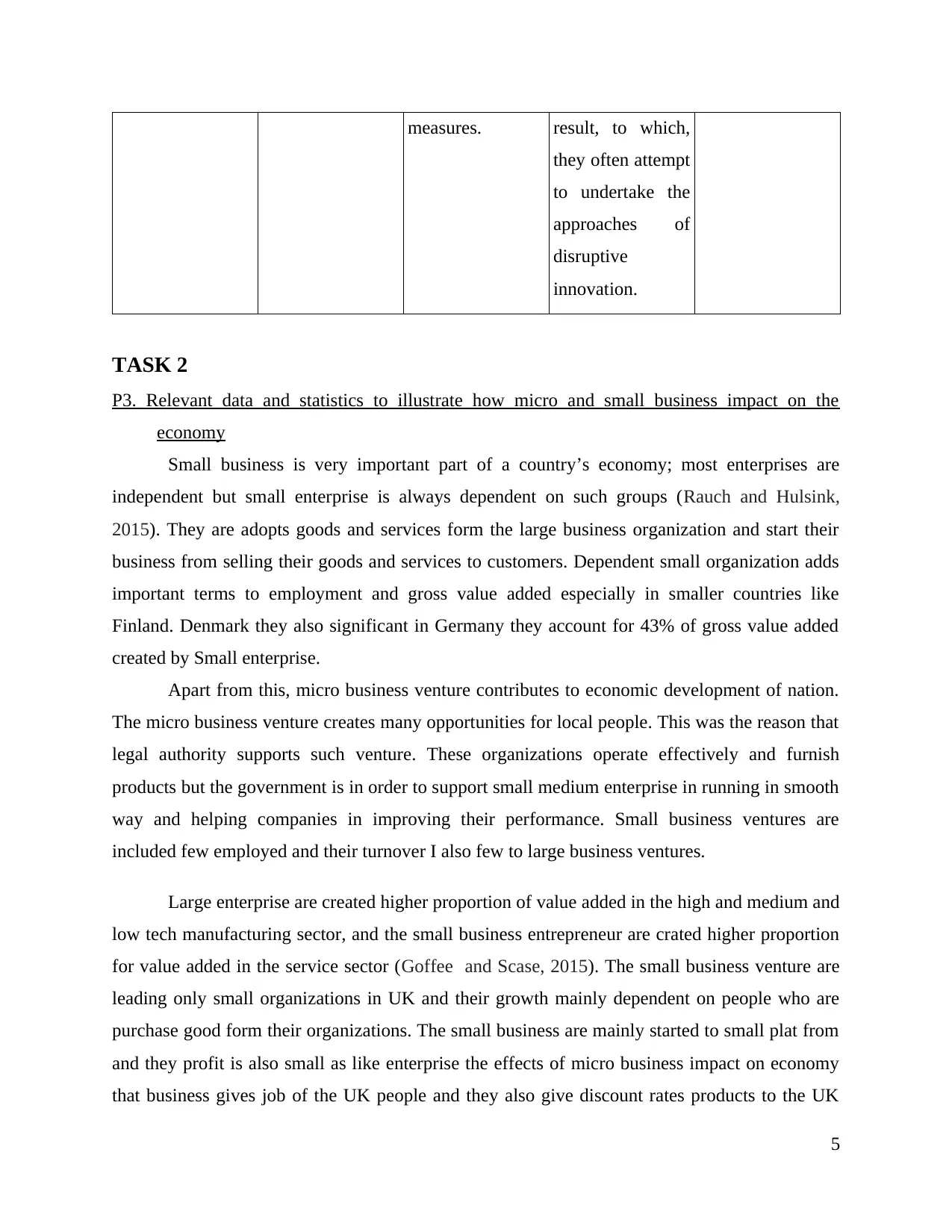
measures. result, to which,
they often attempt
to undertake the
approaches of
disruptive
innovation.
TASK 2
P3. Relevant data and statistics to illustrate how micro and small business impact on the
economy
Small business is very important part of a country’s economy; most enterprises are
independent but small enterprise is always dependent on such groups (Rauch and Hulsink,
2015). They are adopts goods and services form the large business organization and start their
business from selling their goods and services to customers. Dependent small organization adds
important terms to employment and gross value added especially in smaller countries like
Finland. Denmark they also significant in Germany they account for 43% of gross value added
created by Small enterprise.
Apart from this, micro business venture contributes to economic development of nation.
The micro business venture creates many opportunities for local people. This was the reason that
legal authority supports such venture. These organizations operate effectively and furnish
products but the government is in order to support small medium enterprise in running in smooth
way and helping companies in improving their performance. Small business ventures are
included few employed and their turnover I also few to large business ventures.
Large enterprise are created higher proportion of value added in the high and medium and
low tech manufacturing sector, and the small business entrepreneur are crated higher proportion
for value added in the service sector (Goffee and Scase, 2015). The small business venture are
leading only small organizations in UK and their growth mainly dependent on people who are
purchase good form their organizations. The small business are mainly started to small plat from
and they profit is also small as like enterprise the effects of micro business impact on economy
that business gives job of the UK people and they also give discount rates products to the UK
5
they often attempt
to undertake the
approaches of
disruptive
innovation.
TASK 2
P3. Relevant data and statistics to illustrate how micro and small business impact on the
economy
Small business is very important part of a country’s economy; most enterprises are
independent but small enterprise is always dependent on such groups (Rauch and Hulsink,
2015). They are adopts goods and services form the large business organization and start their
business from selling their goods and services to customers. Dependent small organization adds
important terms to employment and gross value added especially in smaller countries like
Finland. Denmark they also significant in Germany they account for 43% of gross value added
created by Small enterprise.
Apart from this, micro business venture contributes to economic development of nation.
The micro business venture creates many opportunities for local people. This was the reason that
legal authority supports such venture. These organizations operate effectively and furnish
products but the government is in order to support small medium enterprise in running in smooth
way and helping companies in improving their performance. Small business ventures are
included few employed and their turnover I also few to large business ventures.
Large enterprise are created higher proportion of value added in the high and medium and
low tech manufacturing sector, and the small business entrepreneur are crated higher proportion
for value added in the service sector (Goffee and Scase, 2015). The small business venture are
leading only small organizations in UK and their growth mainly dependent on people who are
purchase good form their organizations. The small business are mainly started to small plat from
and they profit is also small as like enterprise the effects of micro business impact on economy
that business gives job of the UK people and they also give discount rates products to the UK
5
Paraphrase This Document
Need a fresh take? Get an instant paraphrase of this document with our AI Paraphraser
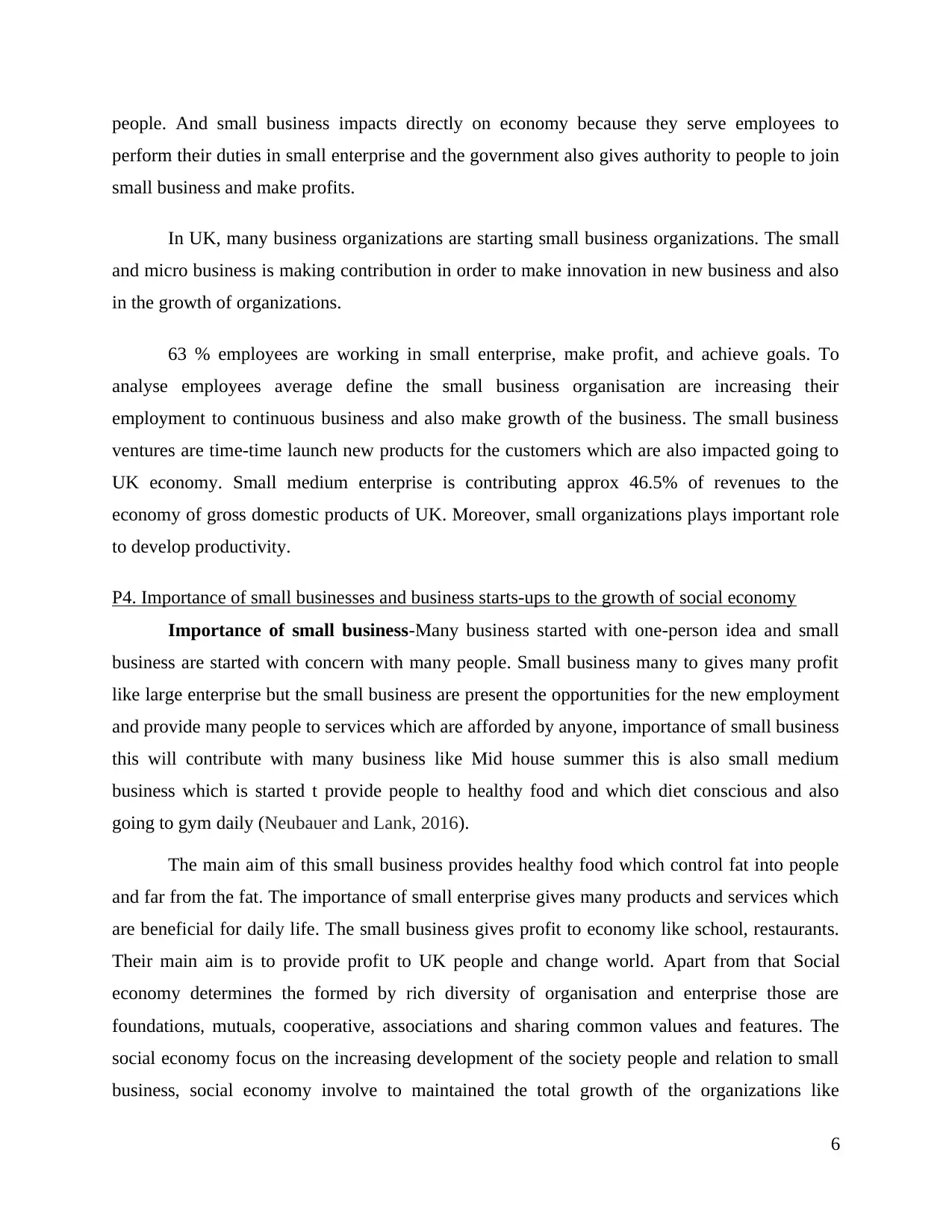
people. And small business impacts directly on economy because they serve employees to
perform their duties in small enterprise and the government also gives authority to people to join
small business and make profits.
In UK, many business organizations are starting small business organizations. The small
and micro business is making contribution in order to make innovation in new business and also
in the growth of organizations.
63 % employees are working in small enterprise, make profit, and achieve goals. To
analyse employees average define the small business organisation are increasing their
employment to continuous business and also make growth of the business. The small business
ventures are time-time launch new products for the customers which are also impacted going to
UK economy. Small medium enterprise is contributing approx 46.5% of revenues to the
economy of gross domestic products of UK. Moreover, small organizations plays important role
to develop productivity.
P4. Importance of small businesses and business starts-ups to the growth of social economy
Importance of small business-Many business started with one-person idea and small
business are started with concern with many people. Small business many to gives many profit
like large enterprise but the small business are present the opportunities for the new employment
and provide many people to services which are afforded by anyone, importance of small business
this will contribute with many business like Mid house summer this is also small medium
business which is started t provide people to healthy food and which diet conscious and also
going to gym daily (Neubauer and Lank, 2016).
The main aim of this small business provides healthy food which control fat into people
and far from the fat. The importance of small enterprise gives many products and services which
are beneficial for daily life. The small business gives profit to economy like school, restaurants.
Their main aim is to provide profit to UK people and change world. Apart from that Social
economy determines the formed by rich diversity of organisation and enterprise those are
foundations, mutuals, cooperative, associations and sharing common values and features. The
social economy focus on the increasing development of the society people and relation to small
business, social economy involve to maintained the total growth of the organizations like
6
perform their duties in small enterprise and the government also gives authority to people to join
small business and make profits.
In UK, many business organizations are starting small business organizations. The small
and micro business is making contribution in order to make innovation in new business and also
in the growth of organizations.
63 % employees are working in small enterprise, make profit, and achieve goals. To
analyse employees average define the small business organisation are increasing their
employment to continuous business and also make growth of the business. The small business
ventures are time-time launch new products for the customers which are also impacted going to
UK economy. Small medium enterprise is contributing approx 46.5% of revenues to the
economy of gross domestic products of UK. Moreover, small organizations plays important role
to develop productivity.
P4. Importance of small businesses and business starts-ups to the growth of social economy
Importance of small business-Many business started with one-person idea and small
business are started with concern with many people. Small business many to gives many profit
like large enterprise but the small business are present the opportunities for the new employment
and provide many people to services which are afforded by anyone, importance of small business
this will contribute with many business like Mid house summer this is also small medium
business which is started t provide people to healthy food and which diet conscious and also
going to gym daily (Neubauer and Lank, 2016).
The main aim of this small business provides healthy food which control fat into people
and far from the fat. The importance of small enterprise gives many products and services which
are beneficial for daily life. The small business gives profit to economy like school, restaurants.
Their main aim is to provide profit to UK people and change world. Apart from that Social
economy determines the formed by rich diversity of organisation and enterprise those are
foundations, mutuals, cooperative, associations and sharing common values and features. The
social economy focus on the increasing development of the society people and relation to small
business, social economy involve to maintained the total growth of the organizations like
6
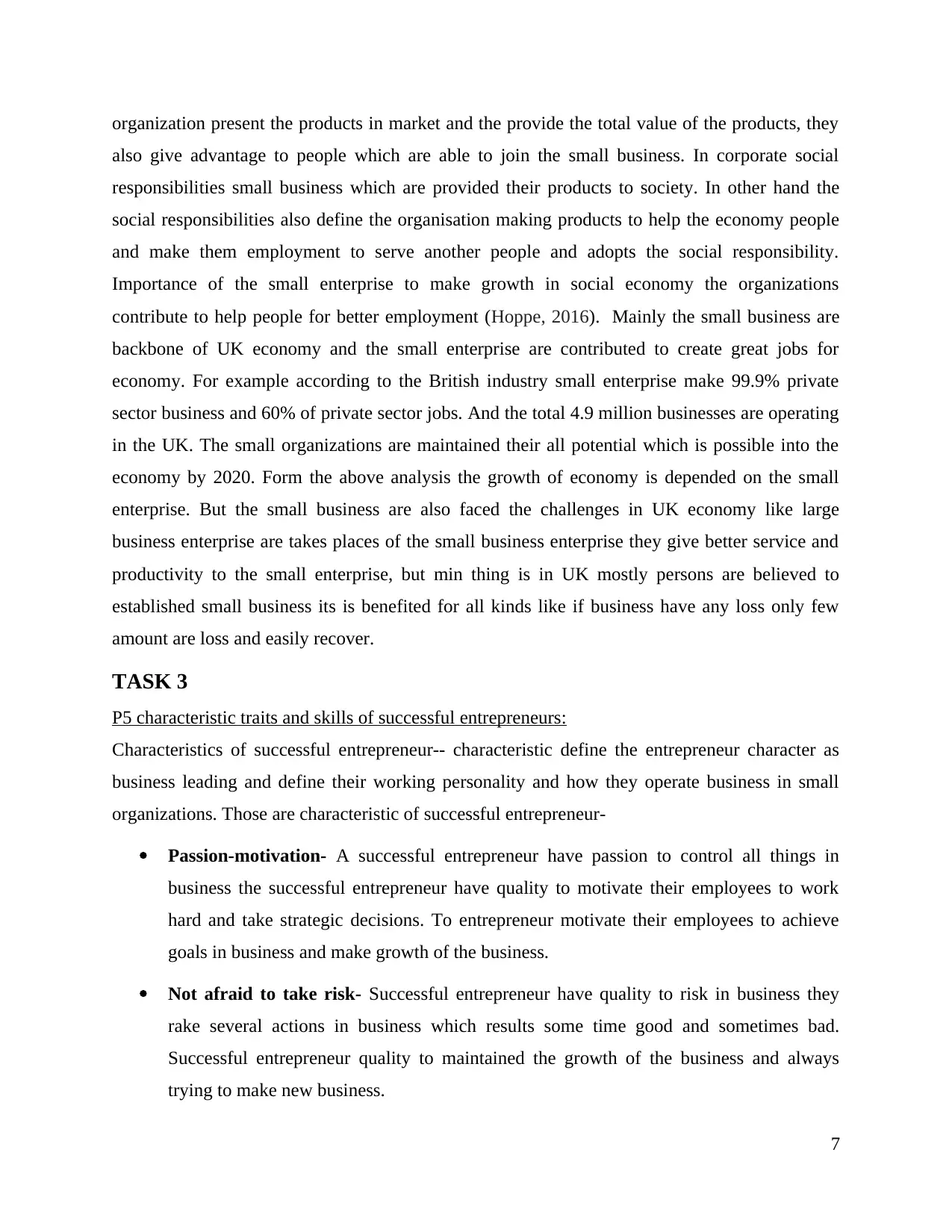
organization present the products in market and the provide the total value of the products, they
also give advantage to people which are able to join the small business. In corporate social
responsibilities small business which are provided their products to society. In other hand the
social responsibilities also define the organisation making products to help the economy people
and make them employment to serve another people and adopts the social responsibility.
Importance of the small enterprise to make growth in social economy the organizations
contribute to help people for better employment (Hoppe, 2016). Mainly the small business are
backbone of UK economy and the small enterprise are contributed to create great jobs for
economy. For example according to the British industry small enterprise make 99.9% private
sector business and 60% of private sector jobs. And the total 4.9 million businesses are operating
in the UK. The small organizations are maintained their all potential which is possible into the
economy by 2020. Form the above analysis the growth of economy is depended on the small
enterprise. But the small business are also faced the challenges in UK economy like large
business enterprise are takes places of the small business enterprise they give better service and
productivity to the small enterprise, but min thing is in UK mostly persons are believed to
established small business its is benefited for all kinds like if business have any loss only few
amount are loss and easily recover.
TASK 3
P5 characteristic traits and skills of successful entrepreneurs:
Characteristics of successful entrepreneur-- characteristic define the entrepreneur character as
business leading and define their working personality and how they operate business in small
organizations. Those are characteristic of successful entrepreneur-
Passion-motivation- A successful entrepreneur have passion to control all things in
business the successful entrepreneur have quality to motivate their employees to work
hard and take strategic decisions. To entrepreneur motivate their employees to achieve
goals in business and make growth of the business.
Not afraid to take risk- Successful entrepreneur have quality to risk in business they
rake several actions in business which results some time good and sometimes bad.
Successful entrepreneur quality to maintained the growth of the business and always
trying to make new business.
7
also give advantage to people which are able to join the small business. In corporate social
responsibilities small business which are provided their products to society. In other hand the
social responsibilities also define the organisation making products to help the economy people
and make them employment to serve another people and adopts the social responsibility.
Importance of the small enterprise to make growth in social economy the organizations
contribute to help people for better employment (Hoppe, 2016). Mainly the small business are
backbone of UK economy and the small enterprise are contributed to create great jobs for
economy. For example according to the British industry small enterprise make 99.9% private
sector business and 60% of private sector jobs. And the total 4.9 million businesses are operating
in the UK. The small organizations are maintained their all potential which is possible into the
economy by 2020. Form the above analysis the growth of economy is depended on the small
enterprise. But the small business are also faced the challenges in UK economy like large
business enterprise are takes places of the small business enterprise they give better service and
productivity to the small enterprise, but min thing is in UK mostly persons are believed to
established small business its is benefited for all kinds like if business have any loss only few
amount are loss and easily recover.
TASK 3
P5 characteristic traits and skills of successful entrepreneurs:
Characteristics of successful entrepreneur-- characteristic define the entrepreneur character as
business leading and define their working personality and how they operate business in small
organizations. Those are characteristic of successful entrepreneur-
Passion-motivation- A successful entrepreneur have passion to control all things in
business the successful entrepreneur have quality to motivate their employees to work
hard and take strategic decisions. To entrepreneur motivate their employees to achieve
goals in business and make growth of the business.
Not afraid to take risk- Successful entrepreneur have quality to risk in business they
rake several actions in business which results some time good and sometimes bad.
Successful entrepreneur quality to maintained the growth of the business and always
trying to make new business.
7
⊘ This is a preview!⊘
Do you want full access?
Subscribe today to unlock all pages.

Trusted by 1+ million students worldwide
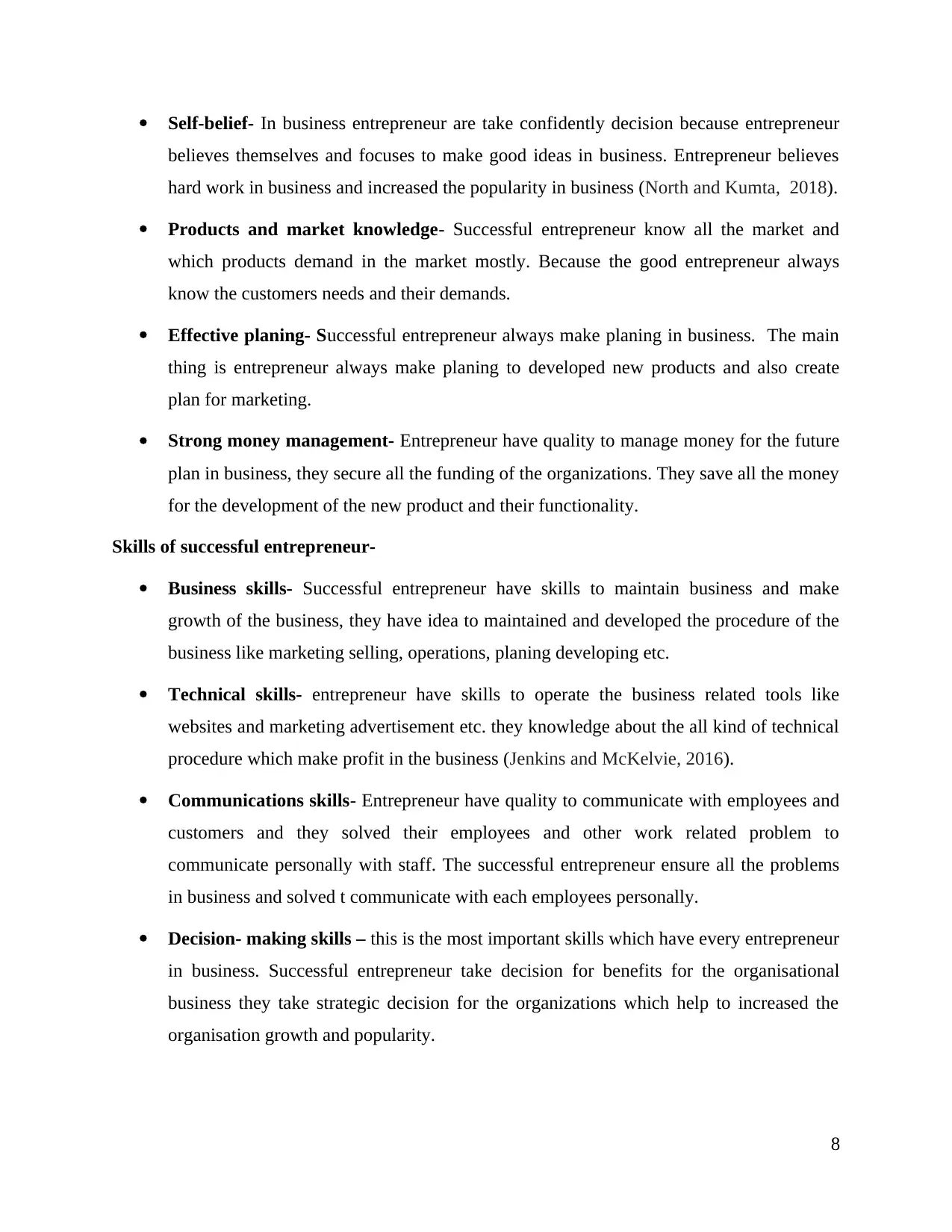
Self-belief- In business entrepreneur are take confidently decision because entrepreneur
believes themselves and focuses to make good ideas in business. Entrepreneur believes
hard work in business and increased the popularity in business (North and Kumta, 2018).
Products and market knowledge- Successful entrepreneur know all the market and
which products demand in the market mostly. Because the good entrepreneur always
know the customers needs and their demands.
Effective planing- Successful entrepreneur always make planing in business. The main
thing is entrepreneur always make planing to developed new products and also create
plan for marketing.
Strong money management- Entrepreneur have quality to manage money for the future
plan in business, they secure all the funding of the organizations. They save all the money
for the development of the new product and their functionality.
Skills of successful entrepreneur-
Business skills- Successful entrepreneur have skills to maintain business and make
growth of the business, they have idea to maintained and developed the procedure of the
business like marketing selling, operations, planing developing etc.
Technical skills- entrepreneur have skills to operate the business related tools like
websites and marketing advertisement etc. they knowledge about the all kind of technical
procedure which make profit in the business (Jenkins and McKelvie, 2016).
Communications skills- Entrepreneur have quality to communicate with employees and
customers and they solved their employees and other work related problem to
communicate personally with staff. The successful entrepreneur ensure all the problems
in business and solved t communicate with each employees personally.
Decision- making skills – this is the most important skills which have every entrepreneur
in business. Successful entrepreneur take decision for benefits for the organisational
business they take strategic decision for the organizations which help to increased the
organisation growth and popularity.
8
believes themselves and focuses to make good ideas in business. Entrepreneur believes
hard work in business and increased the popularity in business (North and Kumta, 2018).
Products and market knowledge- Successful entrepreneur know all the market and
which products demand in the market mostly. Because the good entrepreneur always
know the customers needs and their demands.
Effective planing- Successful entrepreneur always make planing in business. The main
thing is entrepreneur always make planing to developed new products and also create
plan for marketing.
Strong money management- Entrepreneur have quality to manage money for the future
plan in business, they secure all the funding of the organizations. They save all the money
for the development of the new product and their functionality.
Skills of successful entrepreneur-
Business skills- Successful entrepreneur have skills to maintain business and make
growth of the business, they have idea to maintained and developed the procedure of the
business like marketing selling, operations, planing developing etc.
Technical skills- entrepreneur have skills to operate the business related tools like
websites and marketing advertisement etc. they knowledge about the all kind of technical
procedure which make profit in the business (Jenkins and McKelvie, 2016).
Communications skills- Entrepreneur have quality to communicate with employees and
customers and they solved their employees and other work related problem to
communicate personally with staff. The successful entrepreneur ensure all the problems
in business and solved t communicate with each employees personally.
Decision- making skills – this is the most important skills which have every entrepreneur
in business. Successful entrepreneur take decision for benefits for the organisational
business they take strategic decision for the organizations which help to increased the
organisation growth and popularity.
8
Paraphrase This Document
Need a fresh take? Get an instant paraphrase of this document with our AI Paraphraser
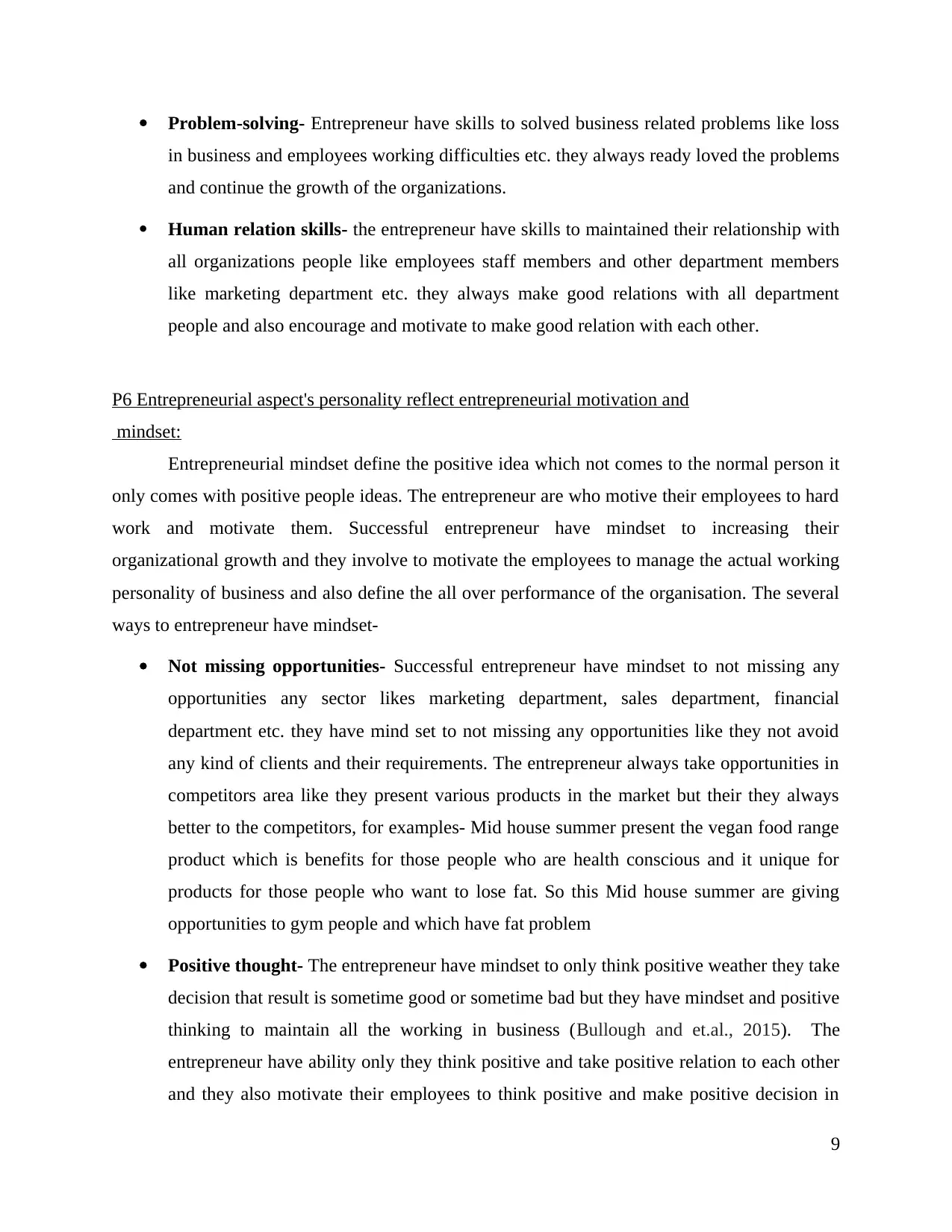
Problem-solving- Entrepreneur have skills to solved business related problems like loss
in business and employees working difficulties etc. they always ready loved the problems
and continue the growth of the organizations.
Human relation skills- the entrepreneur have skills to maintained their relationship with
all organizations people like employees staff members and other department members
like marketing department etc. they always make good relations with all department
people and also encourage and motivate to make good relation with each other.
P6 Entrepreneurial aspect's personality reflect entrepreneurial motivation and
mindset:
Entrepreneurial mindset define the positive idea which not comes to the normal person it
only comes with positive people ideas. The entrepreneur are who motive their employees to hard
work and motivate them. Successful entrepreneur have mindset to increasing their
organizational growth and they involve to motivate the employees to manage the actual working
personality of business and also define the all over performance of the organisation. The several
ways to entrepreneur have mindset-
Not missing opportunities- Successful entrepreneur have mindset to not missing any
opportunities any sector likes marketing department, sales department, financial
department etc. they have mind set to not missing any opportunities like they not avoid
any kind of clients and their requirements. The entrepreneur always take opportunities in
competitors area like they present various products in the market but their they always
better to the competitors, for examples- Mid house summer present the vegan food range
product which is benefits for those people who are health conscious and it unique for
products for those people who want to lose fat. So this Mid house summer are giving
opportunities to gym people and which have fat problem
Positive thought- The entrepreneur have mindset to only think positive weather they take
decision that result is sometime good or sometime bad but they have mindset and positive
thinking to maintain all the working in business (Bullough and et.al., 2015). The
entrepreneur have ability only they think positive and take positive relation to each other
and they also motivate their employees to think positive and make positive decision in
9
in business and employees working difficulties etc. they always ready loved the problems
and continue the growth of the organizations.
Human relation skills- the entrepreneur have skills to maintained their relationship with
all organizations people like employees staff members and other department members
like marketing department etc. they always make good relations with all department
people and also encourage and motivate to make good relation with each other.
P6 Entrepreneurial aspect's personality reflect entrepreneurial motivation and
mindset:
Entrepreneurial mindset define the positive idea which not comes to the normal person it
only comes with positive people ideas. The entrepreneur are who motive their employees to hard
work and motivate them. Successful entrepreneur have mindset to increasing their
organizational growth and they involve to motivate the employees to manage the actual working
personality of business and also define the all over performance of the organisation. The several
ways to entrepreneur have mindset-
Not missing opportunities- Successful entrepreneur have mindset to not missing any
opportunities any sector likes marketing department, sales department, financial
department etc. they have mind set to not missing any opportunities like they not avoid
any kind of clients and their requirements. The entrepreneur always take opportunities in
competitors area like they present various products in the market but their they always
better to the competitors, for examples- Mid house summer present the vegan food range
product which is benefits for those people who are health conscious and it unique for
products for those people who want to lose fat. So this Mid house summer are giving
opportunities to gym people and which have fat problem
Positive thought- The entrepreneur have mindset to only think positive weather they take
decision that result is sometime good or sometime bad but they have mindset and positive
thinking to maintain all the working in business (Bullough and et.al., 2015). The
entrepreneur have ability only they think positive and take positive relation to each other
and they also motivate their employees to think positive and make positive decision in
9
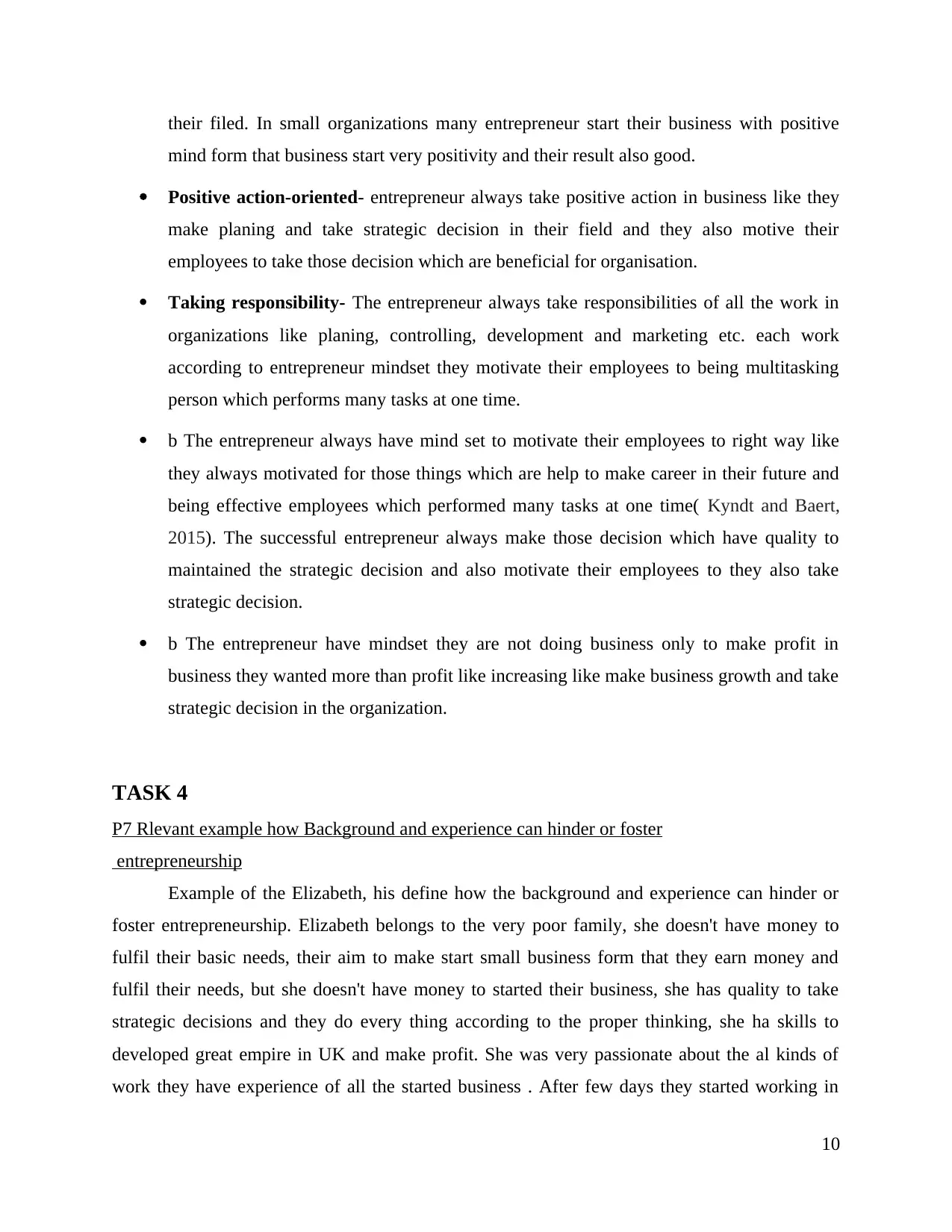
their filed. In small organizations many entrepreneur start their business with positive
mind form that business start very positivity and their result also good.
Positive action-oriented- entrepreneur always take positive action in business like they
make planing and take strategic decision in their field and they also motive their
employees to take those decision which are beneficial for organisation.
Taking responsibility- The entrepreneur always take responsibilities of all the work in
organizations like planing, controlling, development and marketing etc. each work
according to entrepreneur mindset they motivate their employees to being multitasking
person which performs many tasks at one time.
b The entrepreneur always have mind set to motivate their employees to right way like
they always motivated for those things which are help to make career in their future and
being effective employees which performed many tasks at one time( Kyndt and Baert,
2015). The successful entrepreneur always make those decision which have quality to
maintained the strategic decision and also motivate their employees to they also take
strategic decision.
b The entrepreneur have mindset they are not doing business only to make profit in
business they wanted more than profit like increasing like make business growth and take
strategic decision in the organization.
TASK 4
P7 Rlevant example how Background and experience can hinder or foster
entrepreneurship
Example of the Elizabeth, his define how the background and experience can hinder or
foster entrepreneurship. Elizabeth belongs to the very poor family, she doesn't have money to
fulfil their basic needs, their aim to make start small business form that they earn money and
fulfil their needs, but she doesn't have money to started their business, she has quality to take
strategic decisions and they do every thing according to the proper thinking, she ha skills to
developed great empire in UK and make profit. She was very passionate about the al kinds of
work they have experience of all the started business . After few days they started working in
10
mind form that business start very positivity and their result also good.
Positive action-oriented- entrepreneur always take positive action in business like they
make planing and take strategic decision in their field and they also motive their
employees to take those decision which are beneficial for organisation.
Taking responsibility- The entrepreneur always take responsibilities of all the work in
organizations like planing, controlling, development and marketing etc. each work
according to entrepreneur mindset they motivate their employees to being multitasking
person which performs many tasks at one time.
b The entrepreneur always have mind set to motivate their employees to right way like
they always motivated for those things which are help to make career in their future and
being effective employees which performed many tasks at one time( Kyndt and Baert,
2015). The successful entrepreneur always make those decision which have quality to
maintained the strategic decision and also motivate their employees to they also take
strategic decision.
b The entrepreneur have mindset they are not doing business only to make profit in
business they wanted more than profit like increasing like make business growth and take
strategic decision in the organization.
TASK 4
P7 Rlevant example how Background and experience can hinder or foster
entrepreneurship
Example of the Elizabeth, his define how the background and experience can hinder or
foster entrepreneurship. Elizabeth belongs to the very poor family, she doesn't have money to
fulfil their basic needs, their aim to make start small business form that they earn money and
fulfil their needs, but she doesn't have money to started their business, she has quality to take
strategic decisions and they do every thing according to the proper thinking, she ha skills to
developed great empire in UK and make profit. She was very passionate about the al kinds of
work they have experience of all the started business . After few days they started working in
10
⊘ This is a preview!⊘
Do you want full access?
Subscribe today to unlock all pages.

Trusted by 1+ million students worldwide
1 out of 15
Related Documents
Your All-in-One AI-Powered Toolkit for Academic Success.
+13062052269
info@desklib.com
Available 24*7 on WhatsApp / Email
![[object Object]](/_next/static/media/star-bottom.7253800d.svg)
Unlock your academic potential
Copyright © 2020–2026 A2Z Services. All Rights Reserved. Developed and managed by ZUCOL.



